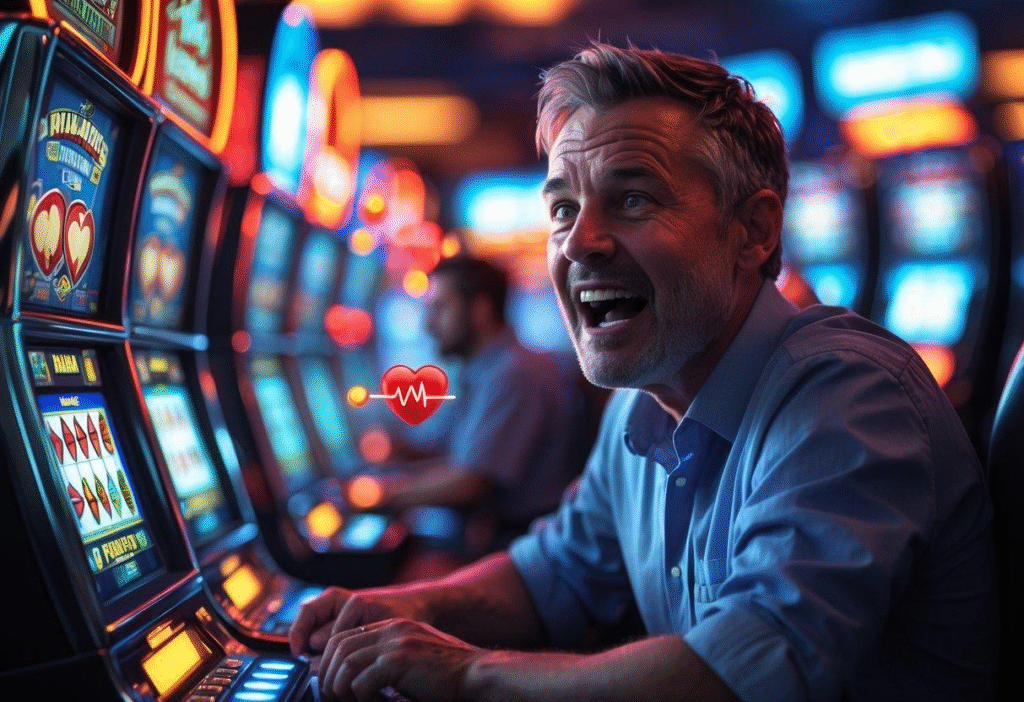Playing pokies triggers a measurable physiological response in your body, causing your heart rate to increase and flooding your system with adrenaline. The flashing lights, rapid gameplay, and intermittent reward system activate your body’s fight-or-flight response, similar to how you’d react to stress or danger.
The electronic gaming machines found in Australian pubs and clubs are specifically designed to stimulate adrenaline production, creating an addictive cycle that can have serious consequences for your cardiovascular and mental health. Research shows that when you play pokies, your adrenal glands release epinephrine into your bloodstream, which binds to receptors in your heart and increases both your heart rate and blood pressure.
Understanding how pokies affect your body’s stress response system reveals why these machines can be so difficult to walk away from. The science behind these physiological changes, combined with their widespread availability across Australia, creates significant public health challenges that require both individual awareness and regulatory intervention.
The Science Behind Pokies’ Effect on Heart Rate and Adrenaline
The physiological responses triggered by pokies involve complex interactions between your nervous system, hormone production, and cardiovascular function. Your body treats the excitement and anticipation of pokies similarly to other stress-inducing situations, releasing powerful chemicals that directly impact your heart rate and overall arousal levels.
Understanding Adrenaline and the Body’s Stress Response
Adrenaline, also known as epinephrine, is produced by your adrenal glands during times of excitement, fear, or stress. This hormone serves as a key component of your body’s fight-or-flight response system.
When released into your bloodstream, adrenaline creates several immediate physiological changes. Your heart rate increases as adrenaline binds to beta-adrenergic receptors in your heart muscle. Your airways dilate to improve oxygen intake, whilst your pupils widen to enhance visual awareness.
Key adrenaline effects include:
- Increased heart rate and blood pressure
- Enhanced glucose release for quick energy
- Improved blood flow to vital organs and muscles
- Heightened alertness and focus
Your nervous system regulates these responses through neurotransmitters and hormones that control your heart’s pacemaker cells. The sinus node in your right atrium responds directly to these chemical signals, causing rapid changes in your heart rhythm.
How Pokies Stimulate Adrenaline in Players
Pokies trigger adrenaline release through multiple psychological and sensory mechanisms that your brain interprets as exciting or potentially rewarding situations. The anticipation of winning activates your reward pathways, causing your adrenal glands to release adrenaline.
The intermittent reinforcement schedule of pokies creates unpredictable rewards that heighten excitement with each spin. Your brain cannot predict when the next win will occur, maintaining a constant state of anticipation that keeps adrenaline levels elevated.
Pokies stimulate adrenaline through:
- Immediate sensory feedback from lights, sounds, and visual effects
- Unpredictable reward timing that maintains suspense
- Near-miss experiences that create false hope
- Illusion of control through button pressing and timing
The immersive design elements of modern pokies engage multiple sensory levels simultaneously. Themed graphics, animated characters, and interactive bonus rounds create an absorbing environment that your nervous system interprets as stimulating and worthy of heightened arousal.
Physiological Responses: Heart Rate and Excitement
Your cardiovascular system responds immediately to the adrenaline released during pokies play, creating measurable changes in heart rate and blood pressure. Adrenaline causes your heart to beat faster and more forcefully by directly stimulating cardiac muscle receptors.
The hormone affects your heart’s electrical signalling system, accelerating the natural pacemaker rhythm. Your blood vessels also respond to adrenaline by constricting in some areas whilst dilating in others, redirecting blood flow to support heightened alertness.
Cardiovascular responses include:
- Elevated heart rate (often 20-40% above resting)
- Increased blood pressure
- Enhanced cardiac output
- Altered circulation patterns
These physiological changes create the physical sensations you experience as excitement during pokies play. The combination of increased heart rate, heightened alertness, and enhanced sensory perception contributes to the intensity of the gaming experience.
Your body maintains these elevated responses throughout extended pokies sessions, potentially leading to sustained periods of cardiovascular stress. The addictive quality of these physiological responses stems from your brain’s association of these sensations with potential rewards.
Mental Health Consequences of Pokie-Induced Adrenaline Spikes
The repeated adrenaline surges from pokie play create significant mental health challenges that extend far beyond the gaming floor. These physiological responses trigger cascading effects on anxiety levels, depressive symptoms, and overall psychological wellbeing.
Links Between Gambling, Anxiety, and Stress
Pokies trigger your body’s fight-or-flight response through unpredictable reward patterns. Each spin releases adrenaline as you anticipate potential wins or losses.
This constant state of arousal creates chronic anxiety that persists even when you’re away from the machines. Your nervous system remains hypervigilant, expecting the next adrenaline surge.
Physical anxiety symptoms from pokie play include:
- Elevated heart rate during and after sessions
- Muscle tension and restlessness
- Sleep disturbances and racing thoughts
- Digestive issues and appetite changes
The stress hormone cortisol works alongside adrenaline during extended gaming sessions. This combination increases your vulnerability to anxiety disorders and panic attacks.
Your brain begins associating everyday situations with the need for adrenaline stimulation. Normal activities feel dull compared to the intense physiological arousal of gambling.
The Role of Depression in Gambling Harm
Depression often develops as your brain’s reward system becomes dysregulated from frequent adrenaline spikes. The natural dopamine production decreases when not gambling.
You may experience profound mood crashes between gaming sessions. These emotional lows create a cycle where you return to pokies seeking the temporary mood elevation from adrenaline release.
Depression symptoms linked to pokie addiction:
- Persistent feelings of emptiness outside gambling environments
- Loss of interest in previously enjoyable activities
- Social withdrawal and isolation from family and friends
- Feelings of hopelessness about financial and personal situations
The shame and guilt surrounding gambling losses compound depressive symptoms. Your self-esteem deteriorates as you struggle to control your behaviour despite negative consequences.
Financial stress from gambling losses creates additional depressive episodes. The combination of debt anxiety and withdrawal from adrenaline creates severe psychological distress.
Chronic Adrenaline Exposure and Mental Health
Long-term exposure to gambling-induced adrenaline fundamentally alters your brain chemistry and stress response systems. Your baseline anxiety levels increase as your body adapts to frequent hormone surges.
Chronic adrenaline exposure leads to adrenal fatigue and emotional exhaustion. You may feel constantly on edge or alternatively experience emotional numbness.
Mental health impacts of prolonged adrenaline exposure:
- Increased risk of panic disorder and generalised anxiety
- Cognitive impairment affecting decision-making abilities
- Emotional dysregulation and mood swings
- Heightened irritability and anger responses
Your sleep patterns become disrupted as elevated adrenaline levels interfere with natural circadian rhythms. Poor sleep quality exacerbates existing mental health conditions.
The brain’s adaptation to frequent adrenaline spikes creates tolerance. You need increasingly intense gambling experiences to achieve the same physiological response, perpetuating harmful gaming behaviours.
Pokies in Australian Culture: Popularity and Public Health Concerns
Pokies have become deeply embedded in Australian social traditions, whilst their digital evolution has created new accessibility challenges and health concerns. Young Australians face unprecedented exposure through normalised gambling culture and digital platforms.
Aussie Traditions and the Social Appeal of Pokies
Australia maintains one of the world’s most active gambling cultures, with adults spending approximately $1,600 annually on gaming activities. Pokies represent a significant portion of this expenditure.
The machines occupy a central position in Australian social venues. You’ll find them in pubs, clubs, and dedicated gaming facilities across the country, forming part of the leisure landscape.
Cultural normalisation begins early in Australian society. Research indicates that turning 18 often includes the tradition of visiting pokies as a rite of passage.
Key Social Integration Points:
- Community venues (RSL clubs, local pubs)
- Workplace social gatherings
- Birthday celebrations and social occasions
- Weekend entertainment activities
This cultural embedding creates a social acceptance that distinguishes Australia from many other nations. The machines become associated with community gathering spaces rather than solely gambling venues.
Rise of Online Pokies and Accessibility
Today, online pokies have transformed gambling accessibility in Australia. You can now access these games from home, removing traditional barriers like travel time and venue operating hours.
This convenience factor has raised significant public health concerns. The 24/7 availability means you can engage with pokies without natural stopping points that physical venues provide.
The digital transition has created several concerning patterns:
- Increased session lengths due to home comfort
- Reduced social oversight from venue staff
- Easy access during emotional or financial stress
- Seamless payment integration encouraging continued play
Online platforms have generated substantial economic benefits, creating jobs in software development and customer support. However, taxation revenue from these platforms now funds problem gambling support services, highlighting the dual nature of their impact.
Adolescent and Young Adult Exposure through Influencers
Young Australians face heightened pokies exposure through digital channels and cultural normalisation. Social media and online content creators increasingly feature gambling content, creating indirect promotion pathways.
Exposure Mechanisms:
- Gaming content creators featuring pokies gameplay
- Social media advertising targeted at young demographics
- Normalised discussion of gambling wins and losses
- Celebrity endorsements of gambling platforms
The gambling industry has adapted marketing strategies to reach younger demographics through entertainment-focused content. You might encounter pokies content disguised as general gaming or entertainment material.
Educational programs now target age verification and awareness, recognising that traditional boundaries between adult and youth content have blurred online. The convenience of digital access means young people can develop familiarity with pokies mechanics before reaching legal gambling age.
This early exposure creates concerning patterns where gambling becomes normalised entertainment rather than recognised as a regulated adult activity with inherent risks.
Regulatory Responses and Strategies for Reducing Harm
Australian governments are implementing various regulatory measures to address the physiological impacts of poker machines on players’ heart rates and adrenaline responses. Current strategies focus on enforcement improvements, responsible gambling initiatives, and advertising restrictions to protect vulnerable individuals.
Government Regulations and Enforcement
NSW has faced significant criticism for ineffective poker machine regulation. The state auditor-general found that Liquor and Gaming NSW and the Independent Liquor and Gaming Authority failed to focus adequately on harm minimisation.
The audit revealed alarming gaps in oversight. Only 12 gambling inspectors operate across NSW, all based in Sydney. This creates enforcement problems in regional areas where nine of the top 10 suburbs accessing gambling support services are located outside Greater Sydney.
Key regulatory weaknesses include:
- Gaming licences not routinely reviewed once issued
- High-risk venues operating with outdated licence conditions
- Late night gaming permissions remaining unchecked
- Focus on signage compliance rather than venue culture changes
Victoria has introduced pokies reforms including reduced spin rates from 2.3 to 3 seconds per spin. This change aims to slow the physiological arousal cycle that triggers elevated heart rates and adrenaline responses in players.
NSW now requires venues with more than 20 gaming machines to have dedicated Responsible Gaming Officers on duty during operating hours.
Promoting Responsible Gambling and Support
Mental health support services are expanding to address the psychological and physiological impacts of problem gambling. Research shows 87% of regular pokies players experience harm, highlighting the need for intervention strategies.
Current support initiatives include:
- GambleAware services providing counselling and intervention
- Mandatory responsible gambling officer training for venue staff
- Enhanced player identification systems for early intervention
- Referral pathways connecting venues to mental health services
Venues must now implement harm minimisation measures in gaming areas. However, recent Supreme Court decisions have challenged some of these requirements, creating uncertainty about enforcement powers.
Staff training programmes focus on recognising signs of distress, including physical symptoms like rapid heart rate, sweating, and agitated behaviour that indicate elevated stress responses.
Social Media Influencers and Advertising Standards
Australia is considering comprehensive gambling advertising bans to reduce exposure that can trigger addictive responses. Current proposals target both traditional media and digital platforms where influencers promote gambling content.
Social media campaigns by gambling operators often use techniques designed to create excitement and urgency. These marketing strategies can activate the same physiological responses that occur during actual gambling sessions.
Proposed advertising restrictions include:
- Complete bans on gambling advertisements across all media
- Stricter controls on influencer partnerships with gambling companies
- Removal of promotional content that glamorises high-risk gambling behaviours
The advertising standards focus on protecting vulnerable populations, particularly young adults who show heightened physiological responses to gambling-related stimuli. Mental health advocates argue that exposure to gambling promotions can trigger cravings and stress responses in recovering problem gamblers.
Current enforcement of advertising standards remains inconsistent across different platforms and jurisdictions.



